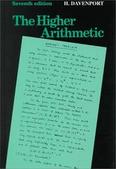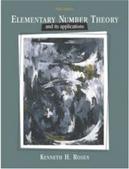Instructor:
Sorin Popescu
(office: Math 3-109, tel. 632-8255, e-mail
sorin at math.sunysb.edu)
Grader:
Caner Koca (office: Math 3-118, e-mail caner at math.sunysb.edu)
Schedule:
TuTh 02:20pm-03:40pm, Lgt Engr Lab 154
Prerequisites:
Either MAT 312 (Applied algebra), or MAT 313 (Abstract Algebra)
or MAT 318 (Classical Algebra) are mandatory prerequisites for this class.
In general some basic algebra exposure is required and assumed, but I will try to
keep prerequisites to a minimum.
Textbook(s):
We will be covering a number of elementary topics
in number theory and some applications. Some theoretical
aspects will be trated in detail while others will provide
brief but insightful and motivating excursions
into topics like Mersenne Primes, number sieves, RSA cryptography,
elliptic curves, etc if time will permit.
There are many excellent undergraduate books on the subject.
Here is a sample list (all of them available in our library), however
we will mainly use this semester only the first two of them:
- The higher arithmetic, by H. Davenport (7th edition)
- Elementary Number Theory and Its Applications , by K. Rosen, (5th edition)
- An Introduction to the Number Theory, H.M. Stark
- Number Theory, G.E. Andrews
- Introduction to Analytic Number Theory, T.M. Apostol
- An Introduction to the Theory of Numbers, I. Niven and H.S. Zuckerman
- A Classical Introduction to Modern Number Theory, K. Ireland and M. Rosen
- Fundamentals of Number Theory, W.J. LeVeque
- Number theory with computer applications, R. Kumanduri and C. Romero
|
 |
 |
These are a mixture of classical texts (for example Dirichlet), modern
efforts, more elementary (for example Kumanduri and Romero) and more
advanced (for example Rosen, or Ireland and Rosen), algebraic (for
example Andrews or Davernport) or analytic approaches (for example, Apostol). This
course will concentrate only on elementary algebraic number theory,
and applications.
Course description:
We will cover only parts of the textbook(s) (Davenport and Rosen) and
the schedule may/will be adjusted based on students' preparation and
progress.
| Topic | Sections in textbook | Week | Notes |
|---|
| Numbers, sequences, and sums. Induction. Fibonacci numbers. Divisibility | Davenport Chap. 1 | 1/23-1/28 | |
| Greatest Common Divisor, Euclidean algorithm, Fundamental theorem of arithmetic | | 1/30-2/4 | |
| Linear Diophantine equations / Congruences | | 2/6-2/11 | |
| Fermat's little theorem / Euler's Formula | Davenport Chap. 2 | 2/13-2/18 | |
Projects, Homework & Grading:
Homework and project (TBA) are an integral part of the
course. Problems marked with an asterisk (*) are for extra credit.
In addition to homework you will be required to hand in a
research/scholarship/computing project. Projects with a nontrivial
writing component may be used to satisfy the Mathematics Upper
Division Writing Requirement.
Your grade will be based on the weekly homeworks (20%), project (25%),
midterm (25%), and the final exam (30%). The two lowest homework grades will be dropped
before calculating the average.
The midterm will be held in class on 03/23.
A review session will be held on
04/28 in Math P-131, 3:00-4:00pm. The
final exam will be comprehensive.
Grades are now posted on the Solar system. Have a nice summer!
Links:
The following is a short list of web sites devoted to number theory
or number theoretic related topics relevant for our class:
-
An On-Line Encyclopedia of Integer Sequences.
- Fibonacci Numbers and Nature. Or
Tony Phillips'
"The most
irrational number". Also
"Who was Fibonacci?": a brief biography of Fibonacci.
- Primes: Lots of interesting facts about prime numbers.
-
Mersenne Primes: interesting facts about Mersenne primes, perfect
numbers, and related topics.
- Primes is P:
about a recent polynomial time deterministic algorithm to test if an input
number is prime or not.
- RSA:
The RSA company's web page containing lots of interesting information
about the RSA public key cryptosystem and cryptography in general,
from both a technological and a socio-political viewpoint.
- The RSA factoring challenge.
- The Wikipedia entry for RSA cryptography.
- The Enigma machine.
- Handbook of Applied Cryptography, by Alfred J. Menezes, Paul C. van Oorschot and Scott A. Vanstone.
It is a handbook for both novices and experts, introducing practical aspects of both conventional and public-key cryptography.
- The GCHQ Challenge (as of July 2005).
- Ron Rivest's Cryptography and Security links page.
- MIT
Lecture Notes on Cryptography, by S. Goldwasser and M. Bellare.
- A brief history/introduction to error-correcting codes Digital Revolution - Error Correction Codes, Joseph Malkevitch, in What's New in Mathematics Feature Column of the AMS.
- Anatomy of
Credit Card Numbers: a discussion of how to determine if a given
credit card number might be valid or not.
- The Wikipedia entry for ISBN (that is
International Standard Book Numbers). However, starting January 1,
2007, the book industry will begin using 13 digit ISBNs to identify
all books in supply chain.
- A summary describing how information is encoded on Compact Discs. CDs use a modified form of the Reed-Solomon code called the Cross Interleave Reed-Solomon Coding (CIRC). Here is a short description of how Reed-Solomon codes are used for error-correction on a audio CD (Red Book Standard).
- FactorWorld is
a web site dedicated to integer factorization results and algorithms. It also includes a list of recent factoring records.
- The list of the 221 currently known proofs of the Quadratic Reciprocity Law (from Legendre (1788) and Gauß (1801) to Szyjewski (2005))
A number of interesting local links that you are warmly encouraged
to explore:
Math Learning Center
The
Math Learning Center (MLC), located in Room S-240A of the Math Tower,
is an important resource. It is staffed most days and some evenings by mathematics tutors
(professors and advanced students).
For more information and a schedule, consult the
MLC web site.
Special needs
If you have a physical, psychiatric, medical or
learning disability that may impact on your ability to carry out
assigned course work, you may contact the Disabled Student Services
(DSS) office (Humanities 133, 632-6748/TDD). DSS will review your
concerns and determine, with you, what accommodations may be necessary
and appropriate. I will take their findings into account in deciding
what alterations in course work you require. All information on and
documentation of a disability condition should be supplied to me in
writing at the earliest possible time AND is strictly
confidential. Please act early, since I will not be able to make any
retroactive course changes.



